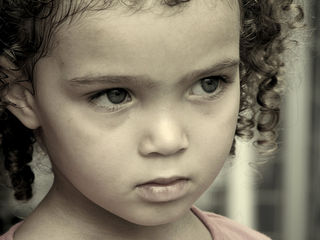Sexual Abuse
Helping Child Victims of Sexual Abuse
What you can do to help children with obesity who have been sexually abused?
Posted June 12, 2016

When a young girl with morbid obesity shows up at a doctor’s or psychologist’s office, it must be understood that sexual abuse may be the cause of, or contributing to her health issues. We must gently share with her the fact that girls are five times more likely to be abused than boys. Then compassionately ask her if she has been abused. We should also remember that age is a significant factor in sexual abuse. The median age for reported sexual abuse is nine years old. So we must inquire in a gentle, loving, risk-free way so that the girl with obesity feels safe and cared for. She may have never known this feeling and it may seem odd to her that a complete stranger cares for her, since she most likely has shared her story with people who ignored her.
The secrecy of sexual abuse keeps victims alone, quiet, and self-soothing, In the case of a girl with obesity, most likely food has become her comfort. How we care for this child should reflect our deepest commitment to acting with compassion and love. If a girl with obesity does share her story, help her feel safe. Let her know you are honored to be part of her journey towards healing and happiness. As you know, this is only the beginning of a very long road for this girl. She will need to tell her story to the authorities; she will need support and love from family and friends during the investigation. She will most likely need medical treatment, and psychological or possibly spiritual counseling. She will need compassion every step of the way. Most importantly, the girl with obesity will need to know that there is an end to the long journey towards health, safety, and happiness and that she is strong enough to take that first step. We can share with her that there is a strong connection between obesity and eating disorders in girls who have been sexually abused. And that this is not a life sentence of eating to sooth all the hurt she has ever felt.
In 2010, Kaiser Permanente,studied more than 30,000 mostly middle-aged obese adults and noticed those who were most successful in losing weight were also most likely to drop out of the weight-loss program and regain weight. The researchers unexpectedly discovered that histories of childhood sexual abuse were common, as were histories of growing up in markedly dysfunctional households.
Clinicians must ask the uncomfortable questions when taking the history of a girl with obesity. Incest, rape, family suicide and parental brutality are unfortunately common in girls with obesity. More importantly clinicians must share with caregivers and children how sexual abuse and eating disorders are connected. There are many theories to explain the link. These are the main ones:
• Sexually abused children may eat as a coping mechanism that can continue into adulthood.
• Children who are sexually abused may feel that gaining weight offers protection and helps them avoid adult sexual advances.
• Some research shows that emotions associated with abuse are thought to lead to higher levels of cortisol, the stress hormone, in the bloodstream. This can increase appetite.
What you can do to help children with obesity who have been sexually abused?
Stay engaged with them during their treatment plan. Give generous amounts of compassion, love and respect for surviving and speaking up. Support the Child Victims Act which will eliminate both criminal and civil statutes of limitation for child sexual abuse. This will prevent predators and their protectors from escaping responsibility for their crimes by waiting out the statue of limitations on reporting child sexual abuse.
On a personal note on June 14, 2016, on the New York State Legislative Office Building steps I will stand beside advocates who are demanding that the Governor sign the Child Victims Act. I am doing this because I am a researcher who has studied the link between obesity and sexual abuse. Federal Bureau Investigation data says that 1 in 5 of ALL children are sexually abused before age 18. We know that pedophiles and sexual abusers are - with rare exception - lifelong abusers, with as many as 100 victims each. Yet, only 10% of this abuse is reported to authorities. There are many reasons for this but a major deterrent is that children are only given one year to report abuse.


